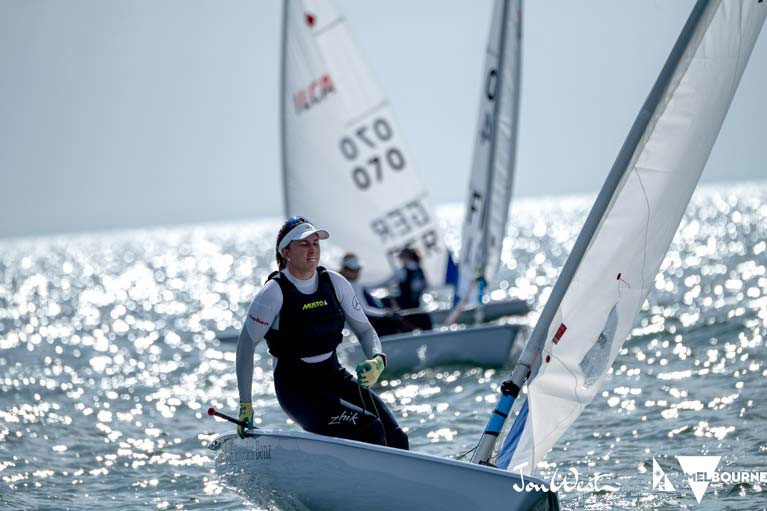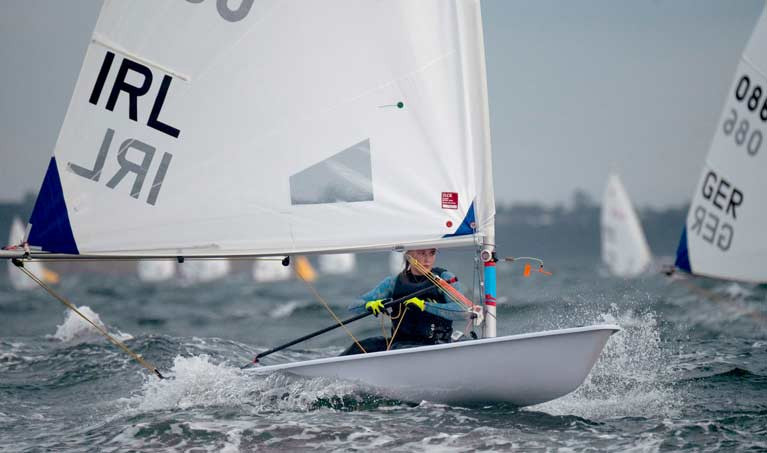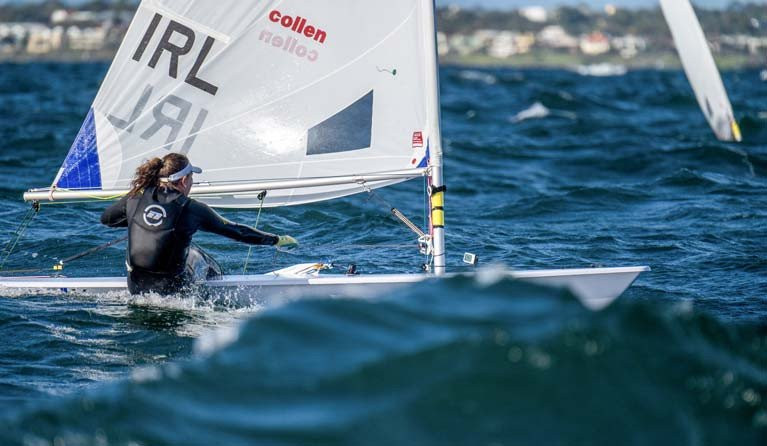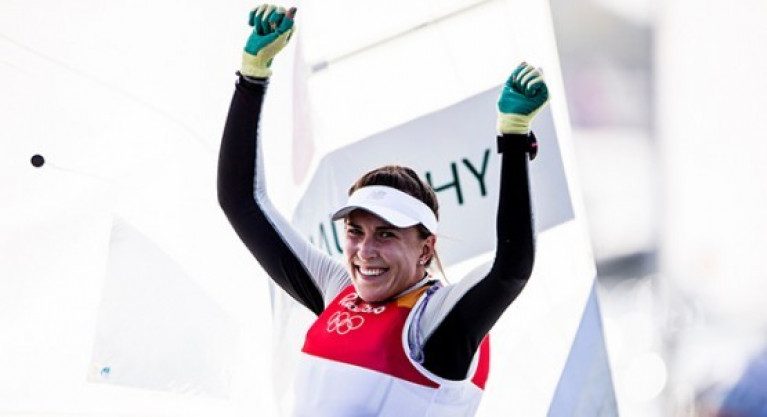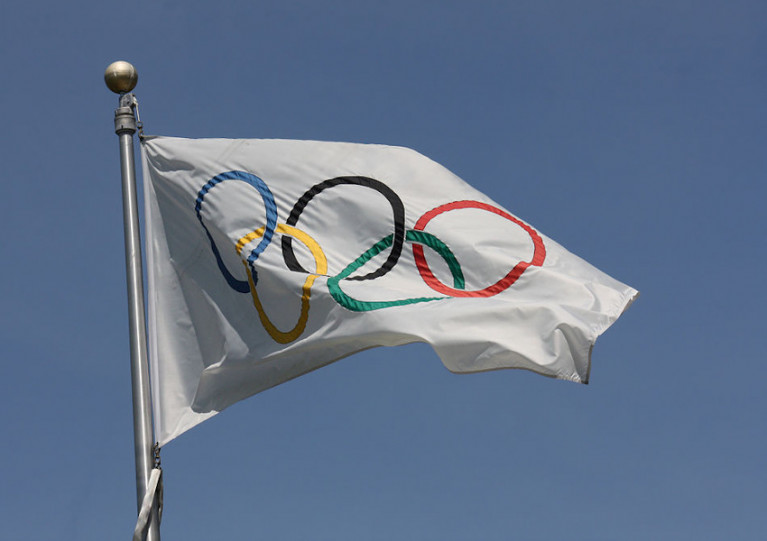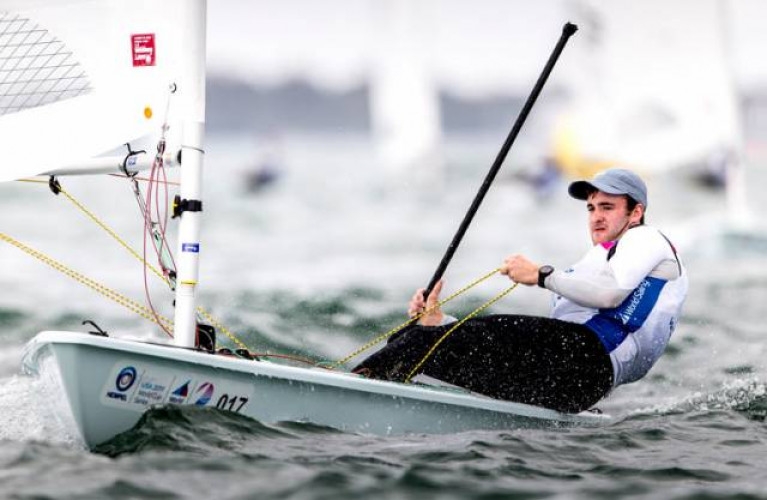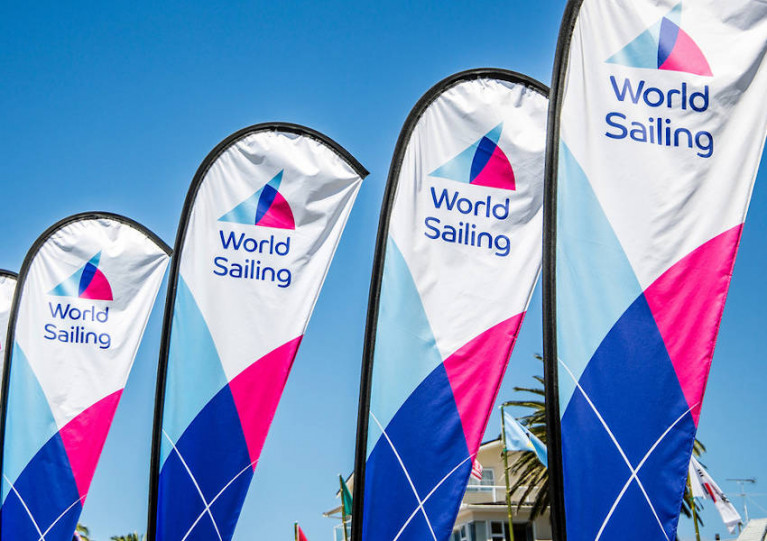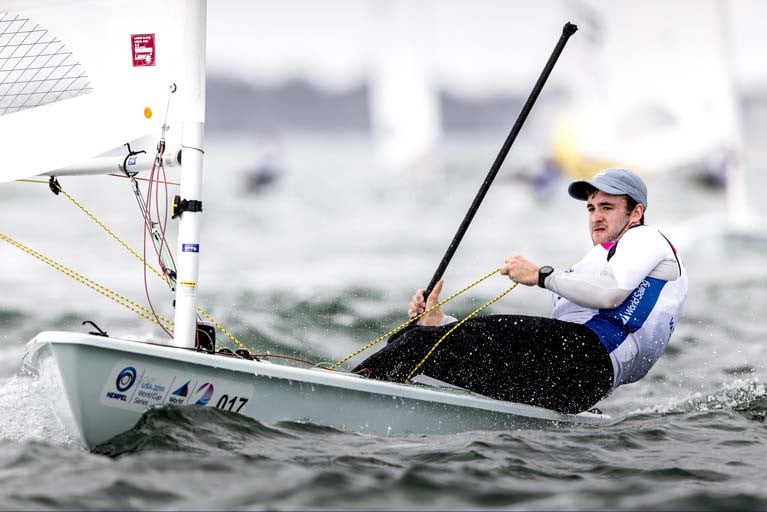Displaying items by tag: Tokyo 2020
Annalise Murphy's bid for Tokyo Gold got a boost today with the Olympic Federation of Ireland announcement of details of its 2020 discretionary funding packages and sailing rewarded with the biggest handout.
The Olympic silver medalist from Rio is the only Irish sailor so far qualified for the postponed Games with men's Irish Laser and 49er skiff campaigns both looking for the last of the Olympic berths.
Murphy was nominated for the Radial class after a trial was cut short by the Irish Sailing Association in June.
The €80,000 announced today provides support for eight Olympic focused and development projects. Many sports had already exceeded the two-award cap placed on this Olympic cycle, making the number of applicants for this latest tranche of funding smaller than previous rounds.
Two winter-sports were awarded grants, reflecting the growing proximity of Beijing 2022.
The funding is entirely generated thanks to the support of commercial partners, primary sponsor, FBD, and OFI partners, Indeed and Circle K. The funding is designed to leverage and enhance Sport Ireland funding, helping National Federations to deliver new performance-related initiatives to support their athletes.
The OFI’s discretionary funding stream is separate to Olympic Solidarity grants to member federations and the 12 Tokyo and 7 Beijing athlete scholarship awards.
Today’s awards were made following the decision of the discretionary funding committee, chaired by OFI CEO, Peter Sherrard and composed of Tokyo Chef de Mission, Tricia Heberle, Sport Ireland High-Performance Director, Paul McDermott, and Independent consultant, Brian MacNeice of Kotinos Partners.
- Bobsleigh and Skeleton €10,000
- Canoeing Ireland €10,000
- Ice Hockey €10,000
- Boxing €10,000
- Gymnastics €10,000
- Modern Pentathlon €10,000
- Volleyball € 8,000
- Sailing €12,000
Peter Sherrard, CEO of the Olympic Federation of Ireland welcomed today’s allocation,
“Since June 2018, we have made 46 sperate grant awards to our member federations under the OFI discretionary funding programme, which is made possible thanks to commercial revenues from our sponsors. Their support and this funding is vital in helping athletes and performance directors realise a wide range of extremely worthy projects, delivering tangible performance and developmental benefits for the athletes.
“As we close out on this first run of the programme in 2020, our objective is to enhance and expand it the for the next four-year period leading up to Beijing 2022 and Paris 2024. This objective is made all the more important due to the difficulties being faced our sports during the Covid 19 pandemic.”
Aoife Hopkins will not appeal last week’s decision to cut-short the Radial Olympic trial for Tokyo 2021 as Howth Yacht Club, expressed its disappointment for both the former U21 European Champion and clubmate Eve McMahon, both contestants in the Irish trials.
Irish Sailing announced its decision to select Rio silver medalist Annalise Murphy, after only one of a series of three trials had been sailed.
Hopkins (21), who was Murphy's (30) nearest rival for the single Tokyo berth, was left 'devastated' last week when the trials were stopped.
"I really can’t understand the decision not to continue with the trials. I am utterly and completely devastated", she told Afloat after the decision.
Speaking at the weekend, Howth Yacht Club Commodore Ian Byrne told Afloat 'Our club is naturally disappointed for Aoife and Eve and that they didn’t get the chance to follow through with their campaigns'.
Under the selection process, if one or more of the trial regattas are cancelled, then the person with the best performance in the completed trial regattas secures the nomination.
Murphy finished the ILCA Laser Radial Women’s World Championship in 12th place, Hopkins finished in 40th, Aisling Keller 63rd, and Academy sailor McMahon 78th.
The manner in which the decision was made and conveyed to Hopkins took her and supporters aback last Monday, (including some sponsors), given that the Olympics is still a year away, adding heft to her argument there was plenty of time to complete the trials series among the four Irish contestants.
Hopkins club has expressed its disappointment at the decision despite the fact that the Rio silver medalist may have set a tough target for the others after a top placing at February's World Championships.
Hopkins is arguably the most affected by the decision, given the length of her campaign and also that she might have expected to be in Tokyo, before Annalise’s return to the class after she gave up on the 49er FX last September.
Hopkins also had a club rival in young Academy sailor Eve McMahon who had been given the chance to contest the trial as a 16-year-old, so the Radial trial was of significant interest at Ireland's biggest yacht club.
McMahon is playing a ‘long game’, with a clear focus on future campaigns. A talented racer, she already has what it takes to compete at the highest level and was crowned U17 champion at the Worlds in February.
Hopkins says she is taking time out to reassess her situation.
'Aoife is a talented and hard-working competitor and once she’s had the time to reflect on her situation, she will emerge stronger than ever, Howth's Brian Turvey told Afloat. 'it’s easy to forget that Eve is still only 16 years of age and she has a terrific future ahead of her'.
'We have followed their progress and supported their campaigns since their first aspirations in competition and we are gutted for them after what must feel like a lifetime of commitment', Commodore Byrne added.
We wish Annalise well and hope that Irish Sailing’s interjection in this process produces the right result, the HYC Commodore said.
As Afloat previously reported, Irish Sailing's James O'Callaghan said "Annalise’s performance in the 2020 Worlds made her a clear favourite to win the scheduled trials. By nominating her now the Irish Sailing Board have ensured that team preparations can move focus to the Olympics rather than preparing for domestic trials”.
He went on to say: “for sure this is tough on Aoife but she is still very young and can benefit massively from team training planned in Tokyo”.
O'Callaghan said at the weekend that no appeals against the decision had been received. Murphy's nomination will be put forward to the Olympic Federation of Ireland for ratification.
Annalise Murphy Selected for Tokyo 2021 After Olympic Trial is Cut Short Due to Coronavirus
Rio 2016 silver medallist Annalise Murphy will be nominated in the Laser Radial to compete at the Tokyo Olympics in 2021, Irish Sailing has announced.
Murphy secured the Laser Radial nomination after the conclusion of the trials in which her three teammates Aoife Hopkins, Aisling Keller and Eve McMahon also competed.
The rivals have been given their reaction to the news here.
There were originally three scheduled trial regattas :
- ILCA Laser Radial Women’s World Championship, Melbourne, Australia (21-28 February 2020)
- Trofeo Princesa Sofia, Palma, Spain (28 March – 4 April 2020)
- Hyéres Regatta, France (18 – 25 April 2020)
Due to the ongoing Covid-19 situation, both the Palma and Hyéres events were cancelled, and the 2020 Olympics postponed until 2021. Under the selection process, if one or more of the trial regattas are cancelled, then the person with the best performance in the completed trial regattas secures the Laser Radial nomination. Annalise Murphy finished the ILCA Laser Radial Women’s World Championship in 12th place, Aoife Hopkins finished in 40th, Aisling Keller 63rd, and Eve McMahon 78th.
While uncertainty still exists as to the future international sailing calendar it is planned that the team will continue to train at home in the Dun Laoghaire Performance HQ. Aoife Hopkins is a senior carded athlete who remains a key member of the training group along with Academy sailor Eve McMahon. Aisling Keller has decided to return to college.
James O’Callaghan, Irish Sailing Performance Director commented “Annalise’s performance in the 2020 Worlds made her a clear favourite to win the scheduled trials. By nominating her now the Irish Sailing Board have ensured that team preparations can move focus to the Olympics rather than preparing for domestic trials”. He went on to say: “for sure this is tough on Aoife but she is still very young and can benefit massively from team training planned in Tokyo”.
Murphy's nomination will now be put forward to the Olympic Federation of Ireland for ratification.
Annalise Murphy Adapts In The Time Of Coronavirus
“In my head I was going, ‘If I give up here, they’re going to be saying that Annalise The Olympian has just quit’. So I couldn’t quit.”
That’s how Annalise Murphy explains her motivation to keep up her fitness and focus for the next Olympics in the time of coronavirus, in an interview with Malachy Clerkin in The Irish Times this weekend.
The Laser Radial silver medallist was counting down the days to the Tokyo 2020 games when two months ago the world began to shut down in efforts to contain the spread of Covid-19.
Within a matter of weeks, the event she and thousands of other athletes had been working towards for months, if not years, was suddenly another year away.
And what’s more, movement restrictions prevented her from even taking to the water for training — and it’s still not entirely clear when that will resume. “I do really miss sailing right now,” she says.
In the meantime, the Irish hero of Rio 2016 has had to refocus her energies, training as much as she can at home.
But the situation, in giving her more time to think about her quest for Ireland’s reserved Laser Radial spot in Tokyo, has also had the side effect of expanding her ambitions.
“Initially, I was very much thinking I was going to retire after the Olympics,” she explains. “But after the Worlds [in February] I was going, ‘Well, I don’t know if I can retire now – I need to go and try to win a Worlds before I retire.’
The Irish Times has much more on the story HERE.
Tokyo 2020 President Says Olympics ‘Will Be Scrapped’ If Coronavirus Threatens Further Delay
The president of Tokyo 2020 says the Olympic Games already postponed to next year “will be scrapped” if it cannot go ahead at its rescheduled date.
As RTE News reports, Yoshiro Mori was responding to concerns that a vaccine for the coronavirus — which has infected more than three million and killed over 200,000 worldwide — may not be readily available before July 2021, when the delayed Tokyo games are now set to begin.
But Mori, a former prime minister of Japan, said he was confident that “we will have won the battle” against Covid-19 by next summer.
A Tokyo 2020 spokesperson later insisted that Mori’s comment about potentially cancelling the next Olympics was “in his own thoughts”.
RTÉ News has more on the story HERE.
Viking Marine touched base over the weekend with brand ambassador Finn Lynch, who’s been keeping both mentally and physically active despite the current Covid-19 restrictions.
While the Irish Laser sailor has had to put his Tokyo 2020 ambitions on hold along with the rest of the Olympic sailing world, it hasn’t dampened his competitive streak — and indeed, he’s found a new outlet for his winning mindset.
“I have become quite addicted to Virtual Regatta,” he says. “I’m currently third in the Irish rankings. I like the tactics involved with the Star racing.”
Otherwise, the National Yacht Club sailor says he’s “keeping my fitness ticking over”.
“I have been doing a lot more weights than normal. Along with that I’m doing some sort of aerobic exercise every day — so that could be a 40-minute row or something like a two-hour bike on my indoor trainer.”
As previously noted on Afloat.ie, Viking Marine remains open for online orders, deliveries and limited collections from its Dun Laoghaire base.
World Sailing Claimed To Be In Dire Financial Straits In Wake Of Olympics Postponement
A vice-president of World Sailing has appealed for the International Olympic Committee (IOC) to advance its share of revenue from Tokyo 2020 as the governing body faces dire financial straits.
Scott Perry told insidethegames that the postponement of the next Olympic Games from this summer to next year, amid the Covid-19 pandemic that has seen events cancelled the world over, has worsened an already precarious funding situation.
World Sailing had been expecting a payout in the region of €12 million from the Tokyo games dividend, which would have filled a predicted hole in its accounts this year.
“The state of World Sailing’s finances were challenged before the Covid-19 crisis and the subsequent postponement of the Olympics,” Perry said.
“The postponement of the Olympics has made our financial challenges much more acute.
“Along with most International Federations we would dearly like an advance from the IOC but at this stage we don’t have any indication that an advance will be forthcoming.”
Insidethegames has more on the story HERE.
Tokyo 2020 Quota to be Filled by 'Historial Results' if Outstanding Qualification Events Prove Impossible
Ireland will keep its only Tokyo 2020 berth so far and could benefit from another if final outstanding qualification events do not take place, according to the world governing body for the sport of sailing.
Confirmation that the place Lough Derg Yacht Club's Aisling Keller won for Ireland in the women's Laser Radial class remains intact was welcome news last week but there was mixed news for the rest of the squad if it proves impossible to host 'fair qualifications' later this year or early next.
Irish campaigns chasing last places in the 49er, Laser and Finn classes were in turmoil last month when COVID-19 hit key final European qualifications in Italy and Spain, ultimately postponing the Games itself.
The race to win the right to represent Ireland in the Radial has also been upset by the disease spread and the four-way trial currently led by Annalise Murphy has sailed only one of three legs so far.
15% of quota places using 'historical results'
World Sailing President Kim Andersen said on April 2nd that after consultation with the International Olympic Committee (IOC), the sport will be able to complete its outstanding qualification events for Africa, Asia and Europe before the Tokyo 2020 Olympic Games in 2021 but if that proves unworkable Andersen also said it would allocate the remaining 15% of quota places using 'historical results'.
In such a scenario, Ireland could increase its representation in Tokyo but only by one boat. There were no details of the proposed 'system', to be used but if the last world championship scoresheets are scrutinised, it will impact Irish campaigns; one positively and two negatively.
As Afloat reported previously, It would be good news for Ireland in the 49er class. Ireland is competing with Belgium, Sweden and Italy for the one remaining European place. Form at the 2020 Worlds suggests that Irish sailors would be favourites for the place having finished ahead of the other three candidates.
In the men's Laser class, there are two European places yet to be won or allocated with four countries in the running – Belgium, Netherlands, Italy and Ireland. Unfortunately, Ireland finished behind all of these at the last World Championships.
In the Finn class, Ireland is well out of the running. There is one European slot remaining, but six as yet to qualify countries finished ahead of Ireland at the recent Gold Cup.
Team Ireland Changes Focus to Tokyo 2021
As news of the postponed Olympic Games spread, Team Ireland athletes came together to demonstrate solidarity, optimism and hope. Right now, the biggest battle is not being fought in the pitches, courts and arenas, but it is the fight against the Covid-19 pandemic that has swept across the world. There are bigger things at stake, and sport is taking a back seat.
On hearing the news about the postponement, some of Ireland’s highest-profile Olympic athletes across the sports came together to send a message of support to Tokyo let by Tokyo Chef de Mission for Team Ireland, Tricia Heberle.
Tokyo 2020 Olympic Games Start Date is 23 July 2021
Ireland's Olympic sailing and rowing teams got the date for the Tokyo 2020 Olympic Games that are now set to start on the 23 July 2021 and run until the 8 August 2021.
This announcement was made following an IOC Executive Board meeting today.
The focus for Team Ireland – which in the sailing discipline currently includes one female Laser Radial and the prospect of two other boats in last chance qualifications is to get more boats qualified and be in a position to equal or better Rio's stunning silver medal performance by Annalise Murphy.
The Ireland rowing team is the strongest ever for the Games. Four boats have already qualified: the women's single and lightweight men's double emerged from the 2019 World Championships as gold medallists; the men's double took silver; the women's pair finished eighth overall. In addition, the women's four and the lightweight women's double will hope to join these through qualifiers.
The Opening Ceremony of the XXXII Olympic Games had been scheduled for the 24 July this year and was forced to be postponed due to the ongoing Covid-19 pandemic. The delay of one year was agreed by the board following discussions with the Tokyo 2020 organising committee and the International Federations.
The confirmation of a date provides clarity for the Olympic Federation of Ireland who can begin work on addressing the operational adjustments that need to take place following this reschedule.
Speaking today, Chef de Mission for Team Ireland in Tokyo, Tricia Heberle welcomed the clarification of a date,
“Now the athletes have a start date for the Games, they can work with their Performance Directors and coaches to start mapping out preparations. Importantly for athletes and sport, the next information we need clarity on are any changes to qualification and the rescheduling of qualification events. This will take some time, so in the short term the focus remains the same, stay healthy and safe over the coming months.
“The priority now is for everyone to following the government guidelines to protect Ireland and the rest of the world against further spread of this virus. A July 2021 start means that we have plenty of time to reactivate preparatory plans and for athletes currently in modified training or on a break of sorts, this period of time can still allow some positive impact on performance.
“If we are smart, this enforced break can make Team Ireland even better.”



























